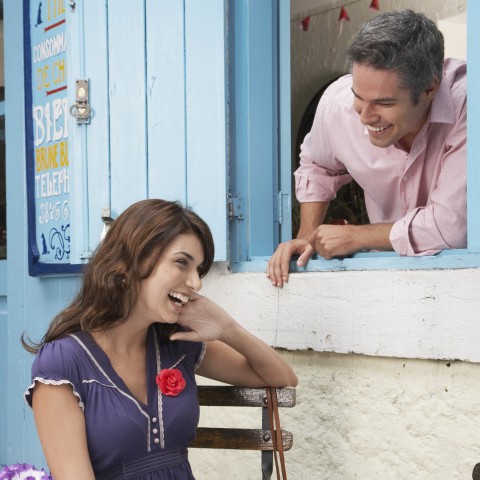
You probably know that speaking another language means that you just… Speak it. Freely. Without thinking about every word. Without pausing to remember the “correct” word, without translating in your head.
The best way to improve your Czech conversation skills: Prepare your “language profile”, learn a few tricks that will make you sound natural and like you speak Czech daily (even when you don’t). You can make your language skills and pronunciation seem way more advanced, and amaze yourself, native speakers, and fellow students alike. It doesn’t matter how old you are. Again, you can do it at any age.
What’s the game plan?
1. Learn phrases about your job, hobbies, life, family, etc.
2. Learn phrases about your potential clients/friends/colleagues jobs, hobbies, life, family, etc.
3. Learn common phrases: how to check in, order food, buy tickets, etc.
4. Improve your conversation skills in Czech by learning global topics/politics vocab.
5. Learn a few conversation starters
6. Learn a few reactions and filler words (this makes you sound like you own the language and are super comfortable speaking it).
Let’s dive right into it.

Friends.
 Table of Contents
Table of Contents
- I am Bob and I Like Cheese: Your Own Czech Language Profile
- Mmmhmmm: Learn Czech Reactions
- Fill the Void… With Czech Filler Words
- Learn Common Czech Questions and Answers
- Learn Czech Conversation Starters
- How to Improve Your Czech Speaking Skills
- How CzechClass101.com Helps You Learn Czech in a Fun Way
1. I am Bob and I Like Cheese: Your Own Czech Language Profile
Start with the basic stuff, and try to keep things simple. Think about what questions you get asked the most when you’re “new” and what questions “new” people ask you. You’ll find more examples and pronunciation here. I suggest you check out this list of phrases you should know before you travel to the Czech Republic.
Jmenuju se [name]. – “My name is [name].
Je mi [age] let. – “I am [age] years old.” (Literally, “I have XX years.”)
Jsem [job title]. / Pracuju jako [job title]. – “I am an [job title]. / I work as [job title].”
Studuju [subject]. – “I study [subject].”
Jsem nezadaná/nezadaný. – “I am single.”
Jsem ženatý/vdaná. – “I am married.”
Mám partnera/partnerku. – “I have a partner.”
Mám [count] děti/dětí. – “I have [count] kids.”
Jsem jedináček. – “I’m an only child.”
Mám bratra a sestru. – “I have one bratr and one sister.”
Miluju [hobby in 4th case noun]. – “I love [hobby, noun].”
Rád/a [verb in 1st person singular]. – “I like to [hobby, verb].
Zajímám se o [noun, 4th case]. – “I am interested in [noun].”
Baví mě [noun, 1st case OR verb in infinitive]. – “I like [hobby, activity].”
Česky se učím asi rok. – “I have been learning Czech for about a year.”
Nikdy jsem nežil/a nikde v zahraničí. – “I have never lived abroad.”
Žila jsem rok/let [year/years] v zahraničí – [countries]. – “I have lived abroad for [year/years]––[countries].
Relaxed example (speed-dating style):
Ahoj, já jsem Martina, je mi 36 let. Pracuju jako překladatelka, jsem jedináček a žiju ve městě. Miluju psy, ráda vařím, baví mě pečení. Zajímám se o politiku a psychologii.
“Hi, I am Martina, I am 36 years old. I am a translator, I’m an only child and I live in a city. I love dogs, I like cooking, and I enjoy baking. I am interested in politics and psychology.”
Slightly more “polite” example (job interview style):
Dobrý den, jmenuju se Pavel, je mi 30 let. Tři roky pracuju jako kodér, ale vystudoval jsem historii. Zajímám se o nové technologie, jsem extrovert a rád pracuju v týmu. Jde mi vedení lidí.
“Good day, my name is Pavel, I am 30 years old. I’ve been working as a coder for three years, I have a degree in history. I am interested in new technology, I like teamwork. I’m good at managing people.”
Very relaxed example:
2. Mmmhmmm: Learn Czech Reactions
Unless you want to nod and smile or shake your head furiously. I’m trying to think about really genuine Czech reactions right now, and I’d say we make a lot of unintelligible noises––more than English speakers––there’s no “oh” or “duh”, just lots of mmmhmmm (oh yeah) and hmhm (no).
Bezva. – “Cool.” (Sort of outdated, and young people will just say “cool”; colloquial)
Aha. – “Aha.” (As in, “now I understand” or “sure, I know you’re making excuses.”)
Výborně. – “Great.”
Dobře. – “Good.”
Tak jo. – “OK.” (Literally “So yeah”; colloquial)
Jsme domluvení. – “Settled.” (Literally “we’re set up.”)
Počítám s tím. – “I’m counting on it.”
Omlouvám se. – “I apologize.” (Sounds very official and big––save for when you do something really horrible.)
To mě mrzí. – “I am sorry.”
Pardon. – “Pardon.” (Very polite)
Nezlobte se. – “Don’t be angry.” (As in, “I’m sorry.”)
S dovolením. – “Excuse me.” (When someone is in your way or you want to interrupt their monologue.)
V pořádku. – “Alright.” (As in “it’s alright.”)
Nic se neděje. – “Nothing is happening. (As in “it’s fine”)
To je dobrý. – “That’s ok.” (Slang version, the ending should be -é.)
V pohodě. – “Cool.” (Colloquial)
Dobrý. – “Good.” (Slang version, the ending should be -é.)
Fajn. – “Fine.” (Colloquial)
OK is mostly used in written form (OK, ok, Ok). Some people do use it, in which case it would be pronounced as ó-ká or okey.
Example:
- Mohl bys mě vyzvednout zítra ráno v sedm? (“Could you pick me up tomorrow at 7AM?”)
Aha, já myslel, že vyrazíme později. (“Oh, I thought we’d leave later.”)
Výborně, už se těším. (“Great, looking forward to it.”)
Jsme domluvení, počítám s tím. (“Settled, I’m counting on it.”)
Fajn, ale říkalas, že vyrazíme dřív. (“Fine, but you said we would leave earlier.”)
- Nezlob se, ale tvoje reakce mi připadají nevhodné. (“Don’t be mad, but I find your reactions inappropriate.”)
V pořádku, je to tvůj názor a já ho respektuju. (“It’s alright, it’s your opinion and I respect it.”)
V pohodě, nic se neděje. Je mi jedno, co si myslíš. (“Cool, it’s fine. I don’t care what you think.”)
- Pardon, šlápla jsem vám na nohu. (“Pardon me, I stepped on your toes.”)
To je dobrý, jste lehká jako pírko. (It’s ok, you’re light as a feather.”)
V pohodě, nic se nestalo. (“It’s ok, nothing happened.”)

OK
3. Fill the Void… With Czech Filler Words
I’d say that Czech filler sounds are a lot more common than Czech filler words (I guess we like to squirm and growl). There’s a lot of uhhhhh and hmmmm, and you can follow suit, of course, BUT! Using Czech filler words will make you sound very relaxed and natural. Czech out our article here.
Tak. – “So” or “Well”
Takže. – “So”
No. – “Well”
Dá se říct. “It’s possible to say.”
Můžeme říct. – “We can say.”
Prostě. – “Just” or “Simply”
Vlastně. – “Actually”
Jako. – “Like”
Jakoby. – “As if”, often used as the American “like”.
Example:
Takže ty si myslíš, že nemusíš nic dělat. (“So you think you don’t have to do anything.”)
Vlastně tě chápu, na tvém místě bych si myslel totéž. (“Actually, I understand, I’d think the same if I were in your place.”)
Pojďme se prostě shodnout na neshodě. (“Let’s just agree to disagree.”)
Jako… Ona musí být úplně hloupá. (“Like… She must be completely stupid.”)
Bylo to… Jakoby… Nevím, jak to popsat. (“It was… As if… I don’t know how to describe it.”)
4. Learn Common Czech Questions and Answers
You can find the most common Czech questions here, and it’s a good idea to check out 25 must-know intermediate phrases as well.
Czechs won’t intrude and ask a lot of questions. In fact, don’t be surprised if they don’t ask anything at all.
Odkud jsi? – “Where are you from?”
Jsem z Ameriky. ( “I’m from America.”)
Jsem z daleka. (“I’m from far away.”)
Jak se máš? – “How are you?”
Dobře, děkuju. (“Good, thanks.”)
Nic moc. (“Nothing much” as in “not very good”)
Kde jsi se naučil/a česky? – “Where did you learn Czech?”
Chodil jsem do kurzu a používal aplikaci. (“I took classes and use an app.”)
Ve škole/v práci. (“At school/work.”)
Používáš nějakou aplikaci, nebo chodíš do kurzu? – “Do you use an app or do you take classes?” (Literally (“or do you go to a course”)
Obojí. Kurz mě moc baví. (“Both. I like the class a lot.”)
Chodím do kurzu. (“I take classes.”)
Proč se učíš česky? – “Why are you studying Czech?”
Protože to potřebuju k práci. (“Because I need it for work.”)
Ze soukromých důvodů. (“For personal reasons.”)
Kolika jazyky mluvíš? – “How many languages do you speak?”
Mluvím dvěma jazyky. (“I speak two languages.”)
Zatím jen jedním, ale učím se druhý. (“Just one so far, but I am learning my second one.”)

How old are you?
5. Learn Czech Conversation Starters
I like to start with a compliment (clothes, food, dogs, babies, hair)––everybody likes to feel special, and you only have one shot at making a great first impression.
Get inspired: Here’s our list of Czech conversational phrases. Learn the most useful compliments here and here.
- Moc se mi líbí tvoje tričko. Kde jsi ho koupil/a? – “I like your shirt. Where did you get it?”
Máma mi ho dala k Vánocům. (“My mom gave it to me for Christmas.”)
- Mohl/a bys mi s něčím pomoct? – “Could you help me with something?”
Sorry, nemám čas. (“Sorry, I don’t have time.”)
- Můžu si k tobě/vám přisednout? – “Can I sit here with you?”
Samozřejmě, posaďte se. (“Of course, take a seat.”)
- Chodíš sem často? – “Do you come here often?”
Jo, každý týden. (“Yeah, every week.”)
- Jaký film máš nejradši? Jaká/jaké je tvoje nejoblíbenější knížka/jídlo? Kdo je tvůj nejoblíbenější autor/herec/zpěvák? – What’s your favorite [movie/book/food/author/actor/singer]?”
Miluju Lennyho Kravitze. (“I love Lenny Kravitz.”)
- Vždycky jsi chtěl/a být [job title]? – “Have you always wanted to be [job title]?”
Ne. Vlastně ani nevím, jak se to stalo. (“No. Actually, I have no idea how it happened.”)
- Baví tě tvoje práce/škola? – “Do you like your job/school?”
Vůbec. Lituju, že jsem nešel na medicínu. (“Not at all. I regret not going to med school.”)
- Líbí se ti tahle hudba/typ umění? Máš rád/a tuhle kuchyni? – “Do you like this kind of music/art? Do you like this cuisine?”
Je moje nejoblíbenější (“It’s my favorite.”)
- Líbí se ti tu? – “Do you like it here?”
Ujde to. (“it’s fine.”)

You look great today.
6. How to Improve Your Czech Speaking Skills
1. Make it personal, and go with the flow. Talking about yourself and things you care about is always easy and fun.
2. You will likely use certain reactions a lot more than others––these don’t have to be your “favorite” first language words. I never say OK in Czech, but I say it all the time in English.
Just find what feels more natural, do not try to translate everything accurately, to a tee.
3. Whenever you catch a word/topic that you often use, write it down, translate it, and learn how to say it in Czech.
4. Get exposure – movies, podcasts, videos. You need to listen in order to repeat and mimic.
5. Get feedback. Start with small, simple conversations: order your food in Czech, talk to your taxi driver in Czech, etc. This sounds like a banal, trite “tip” (I’m bored of it too!), but trust me: This is how you get used to speaking another language. Learn the most common Czech restaurant phrases, talk to the waiter in Czech, thank them in Czech, and then do it again when you have the chance.
6. Practice speaking out loud (preferably in front of a mirror) – get used to your own voice speaking another language, embrace your accent and make sure you work hard on making your pronunciation sound as close to the “original” as possible.

Shadow a native speaker to practice your pronunciation.
7. How CzechClass101.com Helps You Learn Czech in a Fun Way
That’s it, guys! I hope you enjoyed this article and learned something new! In case the nationality words and phrases listed in this article weren’t enough for you, and you want to keep learning, please check out our Basic Bootcamp – the very basic grammar and vocab in 5 compact lessons.
If you’re taking learning Czech seriously and want to learn Czech fast, free and online, you might grab a Czech grammar book or learn online (which is way more convenient). Seriously, learning a new skill has never been easier. Just grab your phone and get to work!
CzechClass101.com will make learning Czech easy, exciting, and fun. With us, it’s not about endless memorizing or thick textbooks. Learn Czech the better way – with us, you’ll make progress faster than you could imagine!
What can you find here?
- English to Czech translation and pronunciation tips/tricks
- Over 630 audio and video lessons
- Vocabulary learning tools
- Spaced repetition flashcards
- Detailed PDF lesson notes
Sign up now, it’s free!
One last thing: Let us know in the comments if this article helped you, and if you feel inspired to start (or continue) learning Czech now! Do you feel more prepared to start your first several convos in Czech now?










